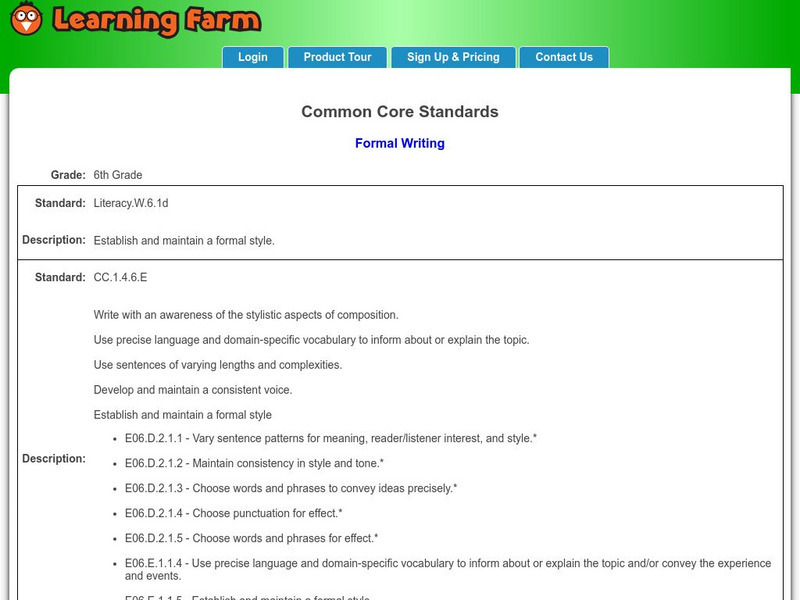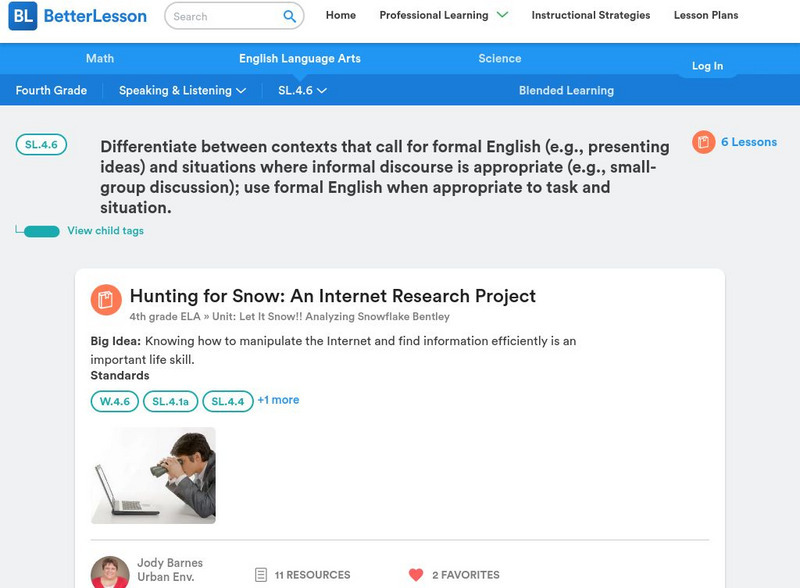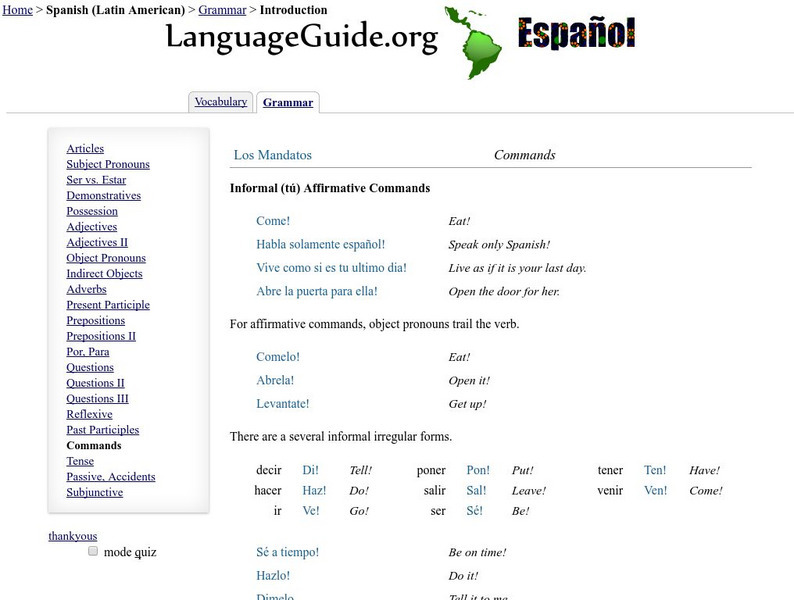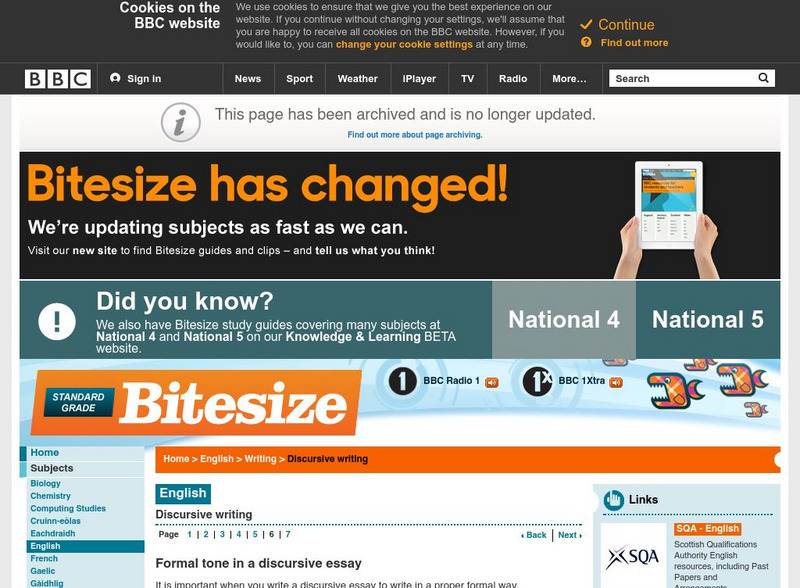Other
Match the Memory: Formal vs Informal Language
Match the Memory Interactive game where players match a word to either formal or informal language.
Other
Pitner's Potpourri: Formal and Informal Language
A Common Core teacher resource provides an approach to educating students on the differences between formal and informal language.
Sophia Learning
Sophia: Formal Language
This slideshow lesson focuses on formal language. It reviews the basics of formal language and the need to know your audience. It explains how to change various types of informal language into formal language and provides examples....
Sophia Learning
Sophia: Informal Language
This lesson discusses informal language and when it should be used. SL.9-10.6 Adapt to task/formal
Online Writing Lab at Purdue University
Purdue University Owl: Academic Writing: Levels of Formality
Basic information explaining how the context, i.e., the audience and your purpose, determines whether you should use formal, semi-formal, or informal language. The links on the sidebar provide much more information about formal academic...
CPALMS
Cpalms: The Lesson Formerly Known as "Wassssuuup"
[Free Registration/Login Required] In this instructional activity, learners are actively engaged in learning how formal and informal language are used in written and oral communications. Downloadable handouts are provided.
Better Lesson
Better Lesson: Audience, Tone, and Style in Informative Text
Students will read samples of informative writing and highlight examples of how tone and style are used by the authors. Students will then apply this knowledge by writing their own informative text. Multiple examples of student work and...
BBC
Bbc: Skillswise: English: Formal and Informal Speaking Quiz [Pdf]
Assess the differences between formal and informal speech. Three levels of difficulty with answers provided.
Online Writing Lab at Purdue University
Purdue University Owl: Using Appropriate Language
Knowing the right language for your particular audience is a necessary skill for all writers. No one wants to offend their audience or appear as though they don't know their content. Learn these rules of thumb to become more familiar...
BBC
Bbc: Skillswise: Speaking and Listening: Formal and Informal Speaking
This Skillswise site focuses on formal and informal speaking. Included are a video about how to decide whether to use formal or informal speech, fact sheets and worksheets for instruction. The Skillswise sites from BBC are geared to...
Learning Farm
Learning Farm: Common Core Standards: Formal Writing
Writing formally means writing using words that are precise, objective, and impersonal. This lesson gives examples of formal language and also provides games and a test. CCSS.ELA-Literacy.WHST.6-8.2.e
ClassFlow
Class Flow: Formal Language
[Free Registration/Login Required] This flipchart can be used to understand features of formal official language through, collecting and analyzing examples, discussing when, why they are used; and noting the conventions of the language,...
Department of Defense
Do Dea: Conventions
Sharpen your use of the formal conventions of English with this self-guided learning module. The module focuses on formal and informal language, making pronouns agree with their antecedents, and common spelling and grammar errors. At the...
Sophia Learning
Sophia: Appropriate Language
This lesson focuses on using appropriate language in formal writing; it discusses pretentious language, jargon, and cliches. It defines each, provides examples, and explains why and how to avoid each. SL.9-10.6 Adapt to task/formal
Grammarly
Grammarly Handbook: Informalities
A list of style techniques (with examples) used to create an informal tone in a written piece.
Georgia Department of Education
Ga Virtual Learning: Informative Speech Critique Sheet (Pdf)
This PDF is a critique form for evaluating informative speeches. SL.9-10.3 Eval Presentation. CCSS.ELA-LiteracySL.3, SL.9-10.3 Eval Presentation
Better Lesson
Better Lesson: Sl.4.6: Differentiate Between Formal and Informal English Contexts
Links to 6 lessons and activities that build student skills in standard SL.4.6: Differentiate between contexts that call for formal English (e.g., presenting ideas) and situations where informal discourse is appropriate (e.g., small...
Grammarly
Grammarly Handbook: Cliches
This page focuse on cliches and explains why they should not be used in formal writing; it provides examples of other words to get the point across more clearly.
Sophia Learning
Sophia: Grammar and Formality
This lesson goes over ways in which the correct use of grammar may be perceived as formality. CCSS.ELA-Literacy.CCRA.L.1 and CCSS.ELA-Literacy.CCRA.SL.6, L.11-12.1a Gram/Usage changes
TES Global
Tes: Letters: Formal & Informal
[Free Registration/Login Required] This resource provides explanations for different modes of writing. Examples of informal and formats are provided.
Language Guide
Language Guide: Los Mandatos
Formation of informal commands, regular and irregular forms are addressed with links to interactive practice activities. In addition, the formation of formal commands are explained with a link to interactive practice activities. A couple...
BBC
Bbc Bitesize Revision: Formal Tone in a Discursive Essay
This page provides several tips for using formal tone in an essay. The tips are arranged into 'Do' and 'Do not use' categories.
BBC
Bbc Bitesize: Speaking and Listening: Standard English
Explains what standard English is and when it is used, the difference between formal and informal language, and non-standard forms of English such as those found in dialects.
English Worksheets Land
English Worksheets Land: Informal vs. Formal Uses of English Worksheets
Language is seen as coming in two basic forms - formal and informal. These worksheets will help students identify the different uses of language.


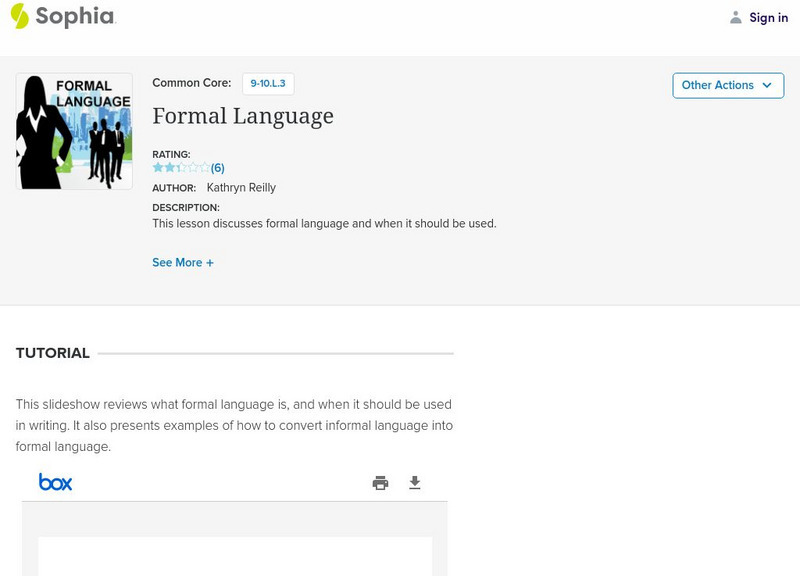
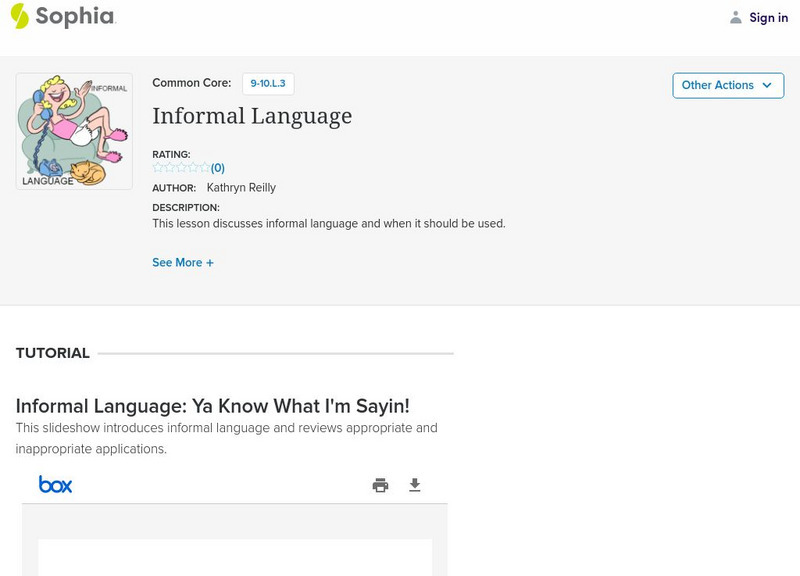



![Bbc: Skillswise: English: Formal and Informal Speaking Quiz [Pdf] Unknown Type Bbc: Skillswise: English: Formal and Informal Speaking Quiz [Pdf] Unknown Type](http://content.lessonplanet.com/resources/thumbnails/411268/large/bwluav9tywdpy2symdiwmduymc0ymtiwny1jegxunwmuanbn.jpg?1589993555)


